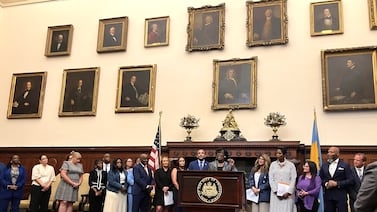Sign up for Chalkbeat Newark’s free newsletter to get the latest news about the city’s public school system delivered to your inbox.
The ongoing court case that accuses New Jersey of failing to fix de facto segregation in its public school system recently marked seven years since it was filed and is no closer to resolution, as two new filings signal more years of expensive litigation ahead.
In one of the briefs submitted to the courts last week, the state opposed the plaintiffs’ recent attempt for an appeal, arguing the case should continue through a trial court. In the other, a think tank asked the court to consider an expansion to the state’s existing interdistrict school choice program as a remedy to the racial and socioeconomic imbalance that the plaintiffs have noted in their lawsuit.
Both filings come amid a divisive political climate, as policies protecting diversity, equity, and inclusion are threatened and efforts to water down the country’s racist history are rampant under a second Trump administration.
The lawsuit, filed against the state in 2018 by families and social justice groups that comprise the plaintiffs, targets school segregation on a statewide scale — a rare occurrence nationally and the first of its kind for New Jersey.
Amid the ongoing historic litigation, the state’s political climate may also be shifting as a contentious primary race for the next governor heats up between five Republican and six Democratic candidates. Some candidates, including Newark Mayor Ras Baraka, have been outspoken on where they stand on school desegregation efforts. Baraka, for instance, supports those efforts.
In the lawsuit, the plaintiffs alleged the state is responsible for the de facto racial and socioeconomic segregation that persists in its public education system of 600-plus school districts, and provided enrollment data for 23 districts with significantly high percentages of Latino and Black students who qualified for free or reduced-price lunch. The state therefore is in violation of its constitution, which is explicit in its ban on segregation, the lawsuit argued.
A 2017 UCLA Civil Rights Project study, cited in the case, found that New Jersey ranked sixth in the nation in terms of the highest segregation of Black students and seventh in segregation of Latino students.
The defendants, composed of the state school board, education department, and education commissioner, countered that segregation in 23, or 3.41%, of the state’s 674 districts didn’t establish a statewide violation.
A trial court judge issued a mixed opinion in 2023 that stopped short of ordering the state to fix its segregated school system and found the plaintiffs failed to prove segregation was statewide, which prompted the parties to attempt to reach a resolution in mediation.
That attempt ultimately failed earlier this year, leading to the plaintiffs motion in April to appeal the trial court judge’s opinion.
The state disputed the plaintiffs’ appeal in its brief last week for the appellate court to deny the plaintiffs’ request that called for the higher court to step in on the case.
Instead, the case should continue proceedings through the trial court, the attorneys for the state defendants wrote in the 46-page brief. Among the points raised, the state argued that there is insufficient legal record for an appellate court to review the case at this point.
“Rather, because of the significance of the claim, the interests of justice demand that this court review this matter only after a sufficient record is developed and the trial court has an opportunity to carefully examine the claim in light of such record,” the state’s opposition brief stated.
The state’s opposition came the same week the New Jersey Policy Institute, a new think tank group that supports school-choice efforts, filed an amicus brief, which is a legal filing to enter the court record from a party that’s not involved in the case. The group wants the courts to consider expanding the state’s existing interdistrict school choice program “as a vehicle for creating greater diversity in New Jersey schools,” the brief states.
The voluntary program, which allows school districts to opt-in as a “choice district,” has been frozen since 2015 but has a waitlist of more than 2,000 students, the group states in its brief.
The group also states that expanding the program “will produce no significant additional administrative burden for the state” since it’s been in place since 1999 and it “presents a ready-made solution that can be implemented almost immediately.”
Catherine Carrera is the bureau chief for Chalkbeat Newark. Contact Catherine at ccarrera@chalkbeat.org.






